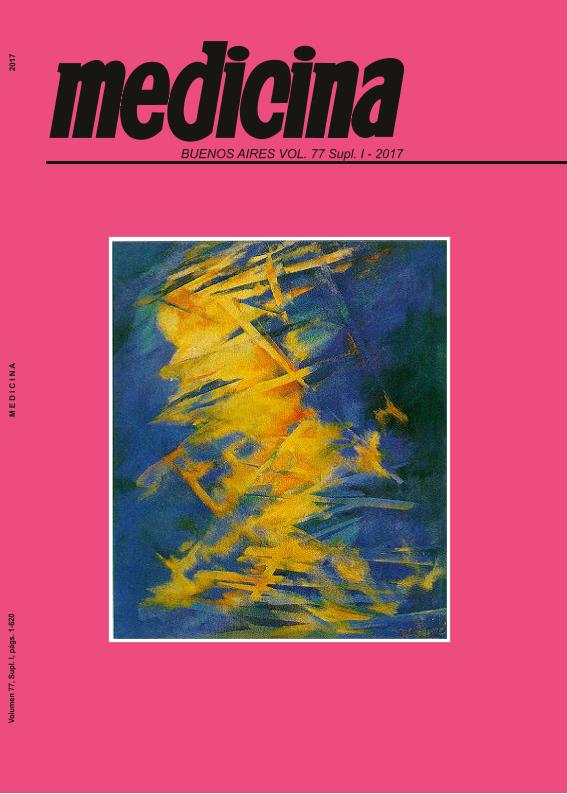Evento
Antitumoral and antimetastatic activity of Maitake D-Fraction in triple-negative breast cancer cells
Alonso, Eliana Noelia ; Ferronato, María Julia
; Ferronato, María Julia ; Gandini, Norberto Ariel
; Gandini, Norberto Ariel ; Fermento, María Eugenia
; Fermento, María Eugenia ; Guevara, Josefina Alejandra
; Guevara, Josefina Alejandra ; Mariani, Florencia
; Mariani, Florencia ; Facchinetti, Maria Marta
; Facchinetti, Maria Marta ; Curino, Alejandro Carlos
; Curino, Alejandro Carlos
 ; Ferronato, María Julia
; Ferronato, María Julia ; Gandini, Norberto Ariel
; Gandini, Norberto Ariel ; Fermento, María Eugenia
; Fermento, María Eugenia ; Guevara, Josefina Alejandra
; Guevara, Josefina Alejandra ; Mariani, Florencia
; Mariani, Florencia ; Facchinetti, Maria Marta
; Facchinetti, Maria Marta ; Curino, Alejandro Carlos
; Curino, Alejandro Carlos
Tipo del evento:
Reunión
Nombre del evento:
LXII Sociedad Argentina de Investigación Clínica; LIII Sociedad Argentina de Investigación Bioquímica y Biología Molecular; LXV Sociedad Argentina de Inmunología, Sociedad Argentina de Andrología; XLVI Sociedad Argentina de Biofísica; XIX Sociedad Argentina de Biología; XLIX Sociedad Argentina de Farmacología Experimental, Reunion Anual de laSociedad Argentina de Fisiología; Reunión de la Sociedad Argentina de Hematología y XXIX Reunión Anual de la Sociedad Argentina de Protozoología
Fecha del evento:
13/11/2017
Institución Organizadora:
Sociedad Argentina de Investigación Clínica;
Sociedad Argentina de Investigación Bioquímica y Biología Molecular;
Sociedad Argentina de Inmunología;
Sociedad Argentina de Andrologia;
Sociedad Argentina de Biofísica;
Sociedad Argentina de Biologia;
Sociedad Argentina de Farmacología Experimental;
Sociedad Argentina de Fisiologia;
Sociedad Argentina de Protozoologia;
Título de la revista:
Medicina (Buenos Aires)
Editorial:
Fundación Revista Medicina
ISSN:
0025-7680
e-ISSN:
1669-9106
Idioma:
Inglés
Clasificación temática:
Resumen
D-Fraction is a proteoglucan extracted from Grifola frondosa (Maitake) mushroom. Previously, we reported that D-Fraction de creases breast cancer (BC) cell viability regardless of hormone receptors and HER2 status of cells. Furthermore, D-Fraction re duces tumor burden and lung metastases in a murine model with hormone-independent LM3 cells. In triple-negative (TNBC) MDA MB-231 cells, we also demonstrated that D-Fraction decreases their migration and invasion capacity. The purpose of the current study is to identify the cellular and molecular mechanisms by which D-Frac tion decreases the migratory/invasive potential of MDA-MB-231 cells. In addition, we propose to evaluate the antitumoral effect of D-Fraction in 4T1 cells, another cell line representative of TNBC subtype. By western blot, we found that D-Fraction increases E-cad herin expression in MDA-MB-231 cells compared to vehicle treat ment (p<0.05). By immunofluorescence, we detected that D-Frac tion decreases the presence of β-catenin in the cytoplasm/nucleus (p<0.001) and promotes its membrane localization (p<0.01). Also, we found that D-Fraction increases the adhesion of MDA-MB-231 cells to substrate (p<0.05). By zymography, we detected that D-Frac tion decreases MMP-2 and MMP-9 activity by 53.59 % (p<0.001) and 27.31 % (p<0.05) respectively, compared to vehicle treatment. On the other hand, manual cell counting and WST-1 assay were performed in TNBC 4T1 cells. D-Fraction decreases the viability of 4T1 cells in a dose- and time-dependent manner (p<0.05). Wound healing assay demonstrated that D-Fraction decreases the migra tory capability of 4T1 cells (p<0.001). By transwell Matrigel assay, D-Fraction reduces the invasive capability of these cells (p<0.001). In conclusion, our results suggest that D-Fraction decreases the via bility and metastatic potential of TNBC cells: promoting an epithelial phenotype; reducing the capability of tumor cells to degrade extra cellular matrix and increasing cell-substrate adhesion.
Palabras clave:
D-FRACTION
,
MAITAKE
,
TRIPLE-NEGATIVE BREAST CANCER
,
ANTITUMORAL
,
ANTIMETASTATIC
Archivos asociados
Licencia
Identificadores
Colecciones
Eventos(INIBIBB)
Eventos de INST.DE INVEST.BIOQUIMICAS BAHIA BLANCA (I)
Eventos de INST.DE INVEST.BIOQUIMICAS BAHIA BLANCA (I)
Citación
Antitumoral and antimetastatic activity of Maitake D-Fraction in triple-negative breast cancer cells; LXII Sociedad Argentina de Investigación Clínica; LIII Sociedad Argentina de Investigación Bioquímica y Biología Molecular; LXV Sociedad Argentina de Inmunología, Sociedad Argentina de Andrología; XLVI Sociedad Argentina de Biofísica; XIX Sociedad Argentina de Biología; XLIX Sociedad Argentina de Farmacología Experimental, Reunion Anual de laSociedad Argentina de Fisiología; Reunión de la Sociedad Argentina de Hematología y XXIX Reunión Anual de la Sociedad Argentina de Protozoología; Buenos Aires; Argentina; 2017; 258-258
Compartir



